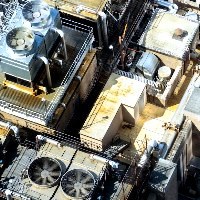(BRUSSELS) – The EU Council and Parliament reached agreement Thursday on new legislation to massively reduce greenhouse gas emissions from fluorinated gases and ozone depleting substances.
The Regulations provisionally agreed will prevent almost 500 million tonnes of further emissions by 2050, and will contribute to EU 2030 climate targets of at least 55% emission reductions, and help make Europe climate-neutral by 2050.
Used in everyday life appliances, for example in refrigeration and air conditioning, F-gases and ODS are highly potent, human-made greenhouse gases with some of the worst global warming potential, often several thousand times stronger than carbon dioxide (CO2).
The Regulation provides incentives to use climate-friendly alternatives, further stimulating the global market and helping other countries to make the transition as well. The world market for equipment using F-gases is currently growing rapidly due to increasing temperatures and higher living standards. The new Regulations contribute towards limiting global temperature rise in line with the Paris Agreement, and set an example internationally, raising ambition considerably beyond the Kigali amendment of the Montreal Protocol.
F-gases currently account for 2.5 % of total GHG emissions at EU level. The reinforced F-gases Regulation will prevent the emission of around 300 million tonnes of CO2 equivalent by 2050.
The agreement tightens the quota system for hydrofluorocarbons (HFC phase-down). The use of Hydrofluorocarbons (HFCs) – the most commonly used F-gases representing around 90% of F-gas emissions – would be reduced by 95% by 2030 compared to 2015, going down to zero by 2050. From 2025, the HFC quota that the Commission allocates every year will be sold for 3 per tonne of CO2 equivalent.
The agreement also introduces new restrictions to make sure that F-gases are only used in new equipment where no suitable alternatives are available or that only the most climate-friendly F-gases are used. The new restrictions will apply from 2025 to 2035 depending on the readiness to shift to climate-friendly solutions for each type of equipment.
In addition to promoting markets for climate-friendly equipment, an export ban will ensure that obsolete equipment using refrigerants with a high global warming potential that may not be sold in the EU can also not be exported to other countries in the world.
The F-gas proposal complies with all rules of the Montreal Protocol, and goes beyond its ambition.
As the market for climate-friendly equipment expands, prices are expected to go down, and the equipment will generate lower energy costs.
Regarding the new Regulation on Ozone-Depleting Substances, which will target products in which ODS were legally used in the past, the EU will prevent the equivalent of around 200 million tonnes of CO2 emissions and 32,000 tonnes of ozone-depleting potential emissions by 2050.
Most additional emission savings will be achieved by requiring ODS to be recovered or destroyed from insulation foams when buildings are renovated or demolished. The use of ODS in the chemical industry will now also be more strictly regulated. Industry and authorities are expected to benefit from cost savings thanks to a modernised licensing system and the end of obsolete quota and registration requirements.
For both pieces of legislation, enforcement and implementation will be improved, making it easier for customs and surveillance authorities to control imports and exports, and to crack down on the illegal trade of gases and related equipment. The agreement will also make monitoring more comprehensive, covering a broader range of substances and activities, and improving the procedures for reporting and verifying data.
The provisional agreement now requires formal adoption by the European Parliament and the Council. Once completed, both Regulations will be published in the Official Journal of the European Union and enter into force.



